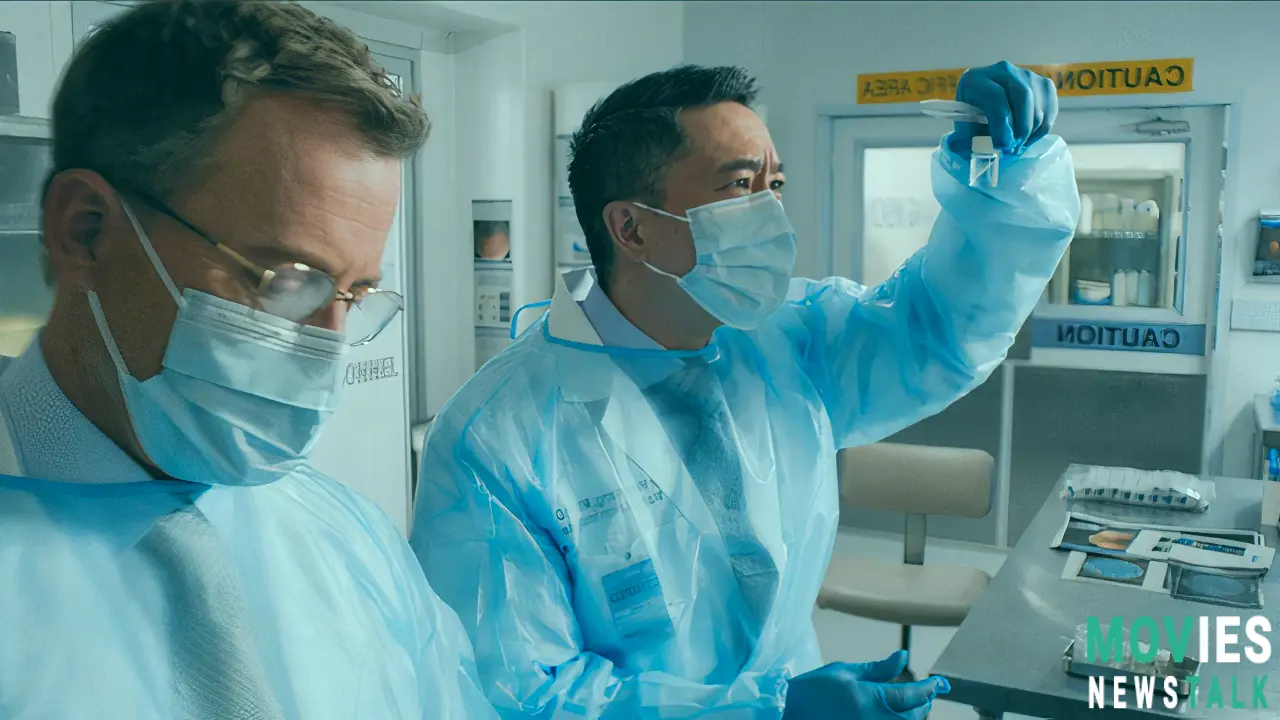Sight's Story Does Not Exude Drama
Made by Angel Studios, most known for its range of religiously-themed material, Sight is a more secular narrative than what the firm usually produces. Although the movie's religious connection usually bubbles under the surface (save from the rare appearance of an evangelizing nun), there's a sense that this background keeps the film from diving below the surface of its protagonists. With as much edge as pancake batter, Dr. Wang and friend and colleague Misha Bartnovsky ( Terry Chen and Greg Kinnear respectively) are mawkishly two-dimensional. Though both of them are great people, their personalities lack any drama to propel the narrative.
As the narrative goes on, (Wang) transforms into a labcoat-wearing saint with only one flaw—he spends too much time trying to save blind youngsters. More cynical viewers could struggle to avoid somewhat resenting such an unquestionably remarkable person. The fact that he is backed by equally placid co-stars (it's quite difficult to find a "villain" in the film, save from a fleeting appearance of Mao's footsoldiers) just serves to accentuate the rather monotonous tone.
Sight's Real Story Is Not Fit For Film
Drawing on Dr. Ming Wang's actual experience, Sight combines flashbacks to the surgeon's turbulent Chinese background with the tale of a revolutionary new cure for sight loss. Although the current plot presents Dr. Wang as a great success, head of a modern facility and a kind workaholic, his past makes it abundantly evident that things weren't always so straightforward. Mao's Cultural Revolution (a fascinating history never fully described) dashed Wang's aspirations in his native country and sent him to America to study.
Though he left China behind, Wang's experiences growing up help to define his perspective on medicine. Inspired by medical parents, he is tremendously impacted by an accident injuring his friend's father, blind. Inspired by this, he opens his eye surgery clinic and provides free assistance to underprivileged patients, so developing a creative technique using the human placenta to mend retinal scar tissue - a process that has helped thousands of people see once more. A expert documentary would fit this fascinating scientific narrative rather nicely. Sadly, Sight falls far short as a drama.
Sight Review: Plodding, Bland and Inoffensive Medical Drama lacks Edge
Andrew Hyatt's Sight is living proof that inspirational source material cannot replace interesting filmmaking; it is a syrupy melodrama with the taste and feel of sticky paste. This isn't exactly the movie's fault in certain respects. Sight's primary goal is to uplift while ever pushing the audience with anything too frightening following a startling introduction. And yet, considering the actual facts behind the creation, the movie suffers from a lack of real drama, emotional depth, and fascinating characters, a squandered opportunity even if the narration is as gently numbing as local anesthesia.
Sight chronicles Ming Wang ( Terry Chen), who fled Communist China and sets out to become an eye surgeon in America. Helping a blind orphan mistreated by her stepmother causes Wang to see the anguish of the Cultural Revolution and the value of his efforts.
The Story Itself Generation More Problems
Furthermore problematic is the narrative itself. The two main causes of conflict are Dr. Wang's failed attempt to shield his childhood friend from revolutionary forces and his twin efforts to restore the eyesight of a young Indian girl (blinded by her stepmother in a brutal opening sequence that clashes angrily with the rest of the tepid action). Though the film never seeks to put anything too possibly disturbing under the microscope, both narratives could raise major emotional issues. Rather, after barely ten minutes of emotional turmoil, Dr. Wang's failure to save either is brushed off.
Sight could be an uplifting experience for some people. The narrative of Dr. Wang is very remarkable, and his successes have truly changed many people's life. But Sight has undermined what made his trip unique in trying to dramatize the actual story. Running across the whole length of Dr. Wang's legacy in a brief end-credits title card, the film never manages to completely explain why his work is so significant. Although this material is valuable for everyone to share, the specifics are essentially inappropriate for movies. Sight cannot see that captivating narrative requires more than a decent heart and a happy conclusion for all its superficial sincerity.
Medical Scenes in Movies Are Perfect for Entertainment
Though they are sometimes attacked by specialists for being unrealistic and factually erroneous, medical sequences in movies are excellent for entertainment.
One especially issues is Dr. Wang's inactivity. He turns into a labcoat-wearing saint as the narrative goes on; his only imperfection is that he spends too much time trying to save blind children. More cynical viewers could struggle to avoid somewhat resenting such an unquestionably remarkable person. The fact that he is backed by equally placid co-stars (it's quite difficult to find a "villain" in the film, save from a fleeting appearance of Mao's footsoldiers) just serves to accentuate the quite boring atmosphere.

